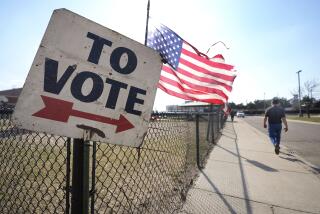Dukakis, Bush Capture Early Vermont Lead
- Share via
MONTPELIER, Vt\o7 .\f7 — Gov. Michael S. Dukakis of neighboring Massachusetts took a huge early lead in Vermont’s non-binding presidential primary Tuesday, a contest with more psychological than electoral significance on the pathway to Super Tuesday.
Among Republicans, Vice President George Bush was ahead of Sen. Bob Dole of Kansas. NBC News projected that Dukakis and Bush would be the winners when all the votes were counted.
Among the Democrats, the Rev. Jesse Jackson ran a surprisingly strong second, with more than a quarter of the Democratic vote in a state with a minuscule number of black residents.
With 58% of the precincts reporting, Bush had 9,838 votes in the Republican primary, or 49% of the total, to Dole’s 8,168, or 40%. Trailing far behind were former religious broadcaster Pat Robertson with 5% and Rep. Jack Kemp of New York with 4%. Former Delaware Gov. Pierre S. (Pete) du Pont IV and former Secretary of State Alexander M. Haig Jr., who have withdrawn from the race, had 2% and 1%, respectively.
Among the Democrats, Dukakis had 12,383, or 55%, and Jackson had 6,333, or 28%. Missouri Rep. Richard A. Gephardt, who visited the state several times, had 8% and Illinois Sen. Paul Simon, who made no real effort here, had 5%. Former Colorado Sen. Gary Hart had 4% and Tennessee Sen. Albert Gore Jr. was not on the ballot.
An NBC exit poll of 1,400 Democratic voters showed that Jackson fashioned his strong second-place showing by gaining two-thirds of the vote from those who described themselves as “very liberal.” He also ran well among men, beating Dukakis. The Massachusetts governor, however, won the women’s vote by a ratio of more than 2 to 1.
Effect of Economic Views
Jackson did better among voters pessimistic about the economy, but most voters said they were optimistic about economic conditions and they went for Dukakis by more than 2 to 1.
The overwhelming second choice of Jackson’s supporters, meanwhile, was Dukakis.
Among 1,400 Republicans polled, the vote divided sharply along ideological lines. Those describing themselves as liberal went strongly for Dole, whereas Bush won the conservative vote. Voters who regarded President Reagan favorably went strongly for the vice president.
Jackson’s showing strengthened his contention, already evident in other contests, that his appeal was broader than his traditional base. He was exceeding by more than three times his showing in the 1984 Vermont primary, when he received almost 8% of the vote.
“I am very pleased with the results,” said Vermont Gov. Madeleine M. Kunin, a Dukakis supporter.
‘Beyond the Black Vote’
At the same time, Kunin said Jackson’s vote “clearly shows his growing strength. His vote goes beyond the black vote.”
Kunin, who sought to portray Dukakis’ victory in the light of a candidacy with a broad national base, was asked about Jackson’s appeal in the South. She said Jackson was certainly expected to do well in the South on Super Tuesday next week.
“Dukakis will do well in the South too,” she said.
After his victory in the New Hampshire primary Feb. 16 and the Maine caucuses on Sunday, Dukakis was a clear favorite. But the Massachusetts governor took no chances.
He had 15 paid staffers in Vermont. They launched an extensive phone canvass of Democratic and independent voters, purchasing lists used in Vermont’s 1986 elections.
In addition to identifying their supporters by phone, the Dukakis campaign sent 40,000 people on the lists a four-page tabloid containing the governor’s record and presidential themes.
Help From Former Senator
Former Massachusetts Sen. Paul E. Tsongas also campaigned for Dukakis, seeking in particular to appeal to residents who have moved to Vermont from the metropolitan areas of the Northeast.
Jackson benefited from an organization of people long active in progressive causes in Vermont, where blacks make up less than 1% of the population.
Bernard Sanders, the socialist mayor of Burlington--Vermont’s biggest city--supported Jackson, who visited the state several times.
Supplementing more than 60 unpaid volunteers, Jackson spent $5,800 on last-minute television ads, hoping to demonstrate--as he did in Maine--appeal to a broad spectrum of voters. He won 7.8% of the vote in the 1984 primary.
Gephardt’s campaign was supported by a steering committee, including several state legislators and Vermont’s lieutenant governor, Howard Dean.
Because of their state’s location next to New Hampshire, many Vermont voters already have been bombarded by broadcast commercials for all candidates.
Endorsements for Dole
Dole began campaigning in Vermont well before New Hampshire. His wife, Elizabeth, reinforced his message by returning to Vermont last week. He was endorsed by several top Republicans, including Sen. Robert T. Stafford, Rep. James M. Jeffords and former Gov. Richard A. Snelling.
Some of the Kansas senator’s supporters, sensing victory, urged him to return to Vermont in the closing days of the campaign.
Bush and Dole had the major Republican presence in Vermont. The vice president’s campaign operated phone banks for four months, seeking to identify and get out his vote. But, as Tuesday drew near, large numbers of voters were still undecided.
A poll published Sunday in the Rutland Herald and the Barre-Montpelier Times Argus in Montpelier said 30% of the voters in both parties were undecided a week before the primary. The poll showed Dukakis far ahead among the Democrats, followed by Jackson. Bush was supported by 41% of voters and Dole by 25%.
Now a Two-Party State
Vermont at one time was a synonym for Republicanism. But today it is a two-party state.
More to Read
Get the L.A. Times Politics newsletter
Deeply reported insights into legislation, politics and policy from Sacramento, Washington and beyond. In your inbox twice per week.
You may occasionally receive promotional content from the Los Angeles Times.








